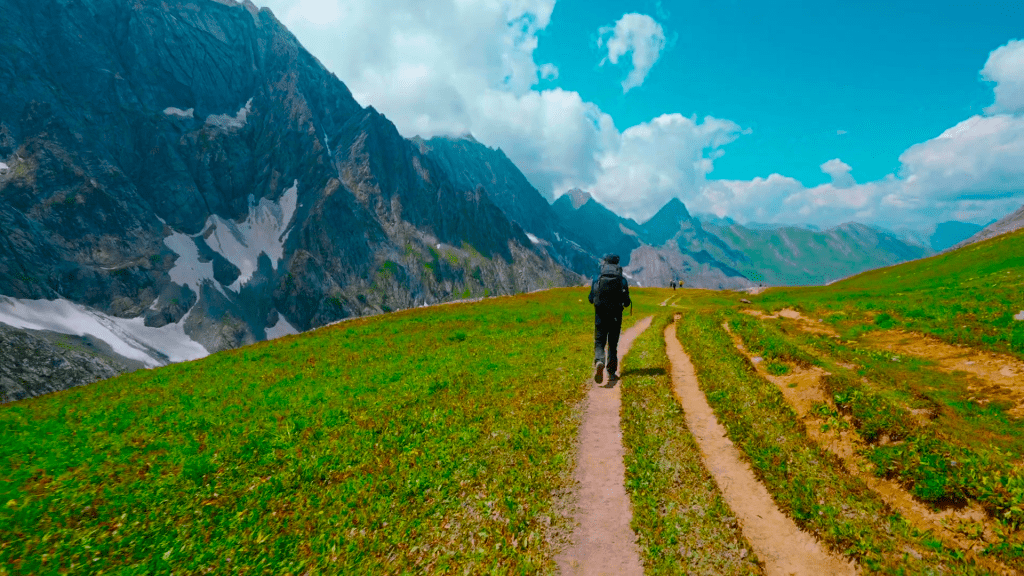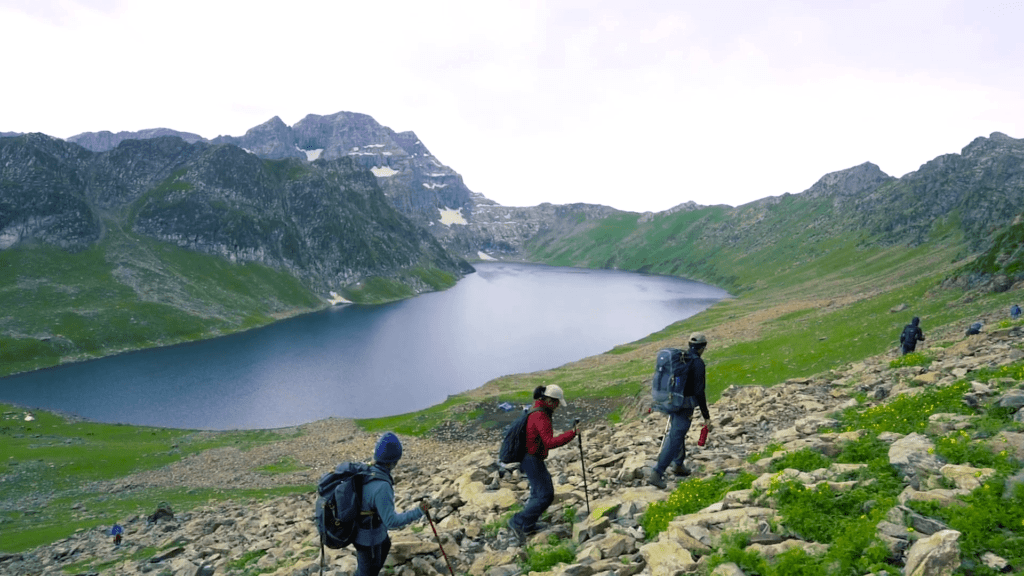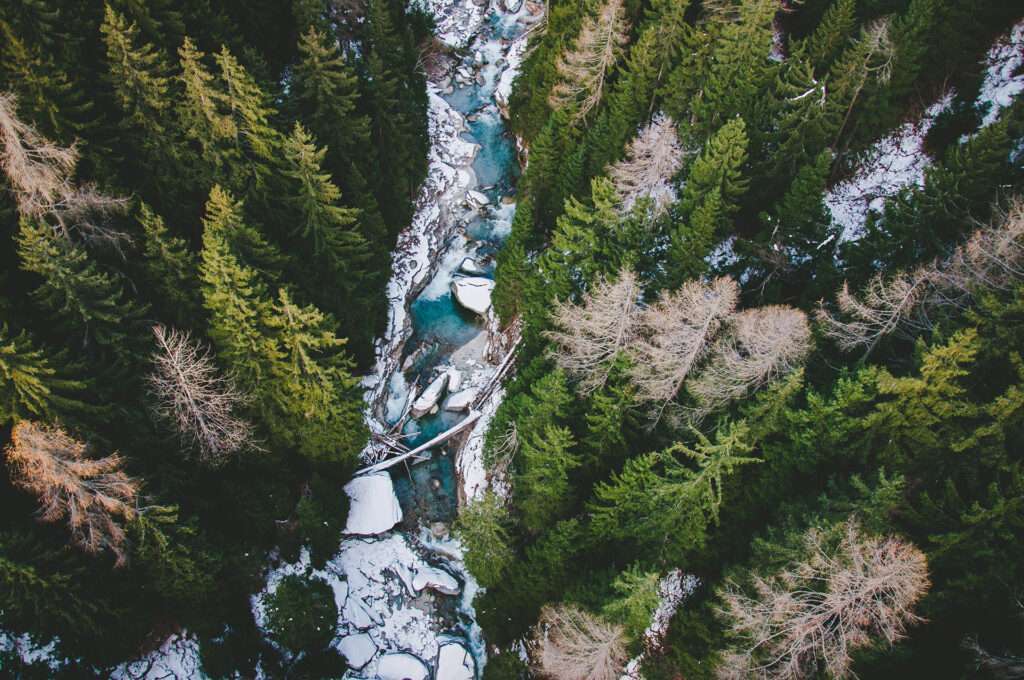Kashmir Tarsar Marsar Lakes Trek
Discover the Tarsar Marsar Lakes Trek: Kashmir’s Alpine Wonderland
Tasar and Masar Lake Trek is one of the best experiences in Kashmir Valley. This hike features beautiful alpine lakes, lush green meadows and beautiful mountains. This trek takes you through beautiful villages, dense forests and open meadows, making it an unforgettable adventure for adventurers and hikers alike. Trekking, Tasar Malsar Trekking, Tasar Lake, Malsar Lake, Kashmir Trekking, India’s Best Trekking, mountain lake, Kashmir adventure, Kashmir Trekking Trails.
Highlights of the Kashmir Tarsar Marsar Trek :
1. Pristine Alpine Lakes: Witness the breathtaking beauty of Tarsar and Marsar Lakes, known for their crystal-clear waters and stunning reflections of the surrounding mountains.
2. Lush Meadows and Scenic Campsites: Experience camping in picturesque meadows such as Lidderwat and Shekwas, surrounded by dense pine forests and alpine flowers.
3. Challenging Terrain: Conquer the moderate to difficult trekking routes that include steep ascents and descents, offering a thrilling adventure for seasoned trekkers.
4. Rich Biodiversity: Encounter diverse flora and fauna, including vibrant wildflowers, majestic pine forests, and wildlife unique to the Kashmir region.
5. Cultural Encounters: Interact with the warm and hospitable local Gujjar and Bakarwal tribes, gaining insights into their traditional way of life.
6. Stunning Mountain Views: Enjoy panoramic views of snow-capped peaks and rugged landscapes that provide a perfect backdrop for photography enthusiasts.
7. Tranquil Environment: Experience the serene and peaceful atmosphere of remote alpine regions, away from the hustle and bustle of city life.
8. Adventure Activities: Engage in activities like fishing in the Lidder River, bird watching in Lidderwat Valley, and exploring dense forests and open grasslands.
9. Historic and Sacred Sites: Visit Marsar Lake, which holds religious significance for local tribes, and explore ancient trails used by shepherds for centuries.
10. Memorable Sunrises and Sunsets: Capture unforgettable moments with spectacular sunrises and sunsets over the alpine lakes and surrounding peaks.
Trek Details
- Duration: 7 Days
- Difficulty Level: Moderate to Difficult
- Best Time to Visit: June to September
- Starting Point: Aru Valley, Kashmir
- Ending Point: Aru Valley, Kashmir
The most affordable price
Scroll Down For Detailed Itinerary:
Detailed Itinerary
Day 1: Arrive in Srinagar, switch to Aru Valley
- Arrival Time: Morning
- journey Distance: 112 km
- Tour Time: 4-5 hours
- Description: Arrive in Srinagar and switch to Aru Valley, a picturesque hamlet recognised for its stunning landscapes. The pressure offers scenic perspectives of the Kashmir Valley, passing thru quaint villages and apple orchards. Upon attaining Aru Valley, settle into your lodging and enjoy the clean mountain air. Spend the night exploring the valley and acclimatizing to the altitude.
Day 2: Aru Valley to Lidderwat
- Trek Distance: 10 km
- Trek Time: 5-6 hours
- Description: start your trek from Aru Valley, ascending thru dense pine forests and luxurious meadows. The path follows the Lidder River, supplying serene views and the sound of rushing water. attain Lidderwat, a stunning valley and a popular campsite for trekkers. installation camp and revel in the night surrounded by using the majestic mountains and grazing sheep.
Day 3: Lidderwat to Tarsar Lake
- Trek Distance: 12 km
- Trek Time: 6-7 hours
- Description: keep your trek from Lidderwat to Tarsar Lake. The path takes you through colourful alpine meadows dotted with wildflowers. Ascend gradually, passing by way of shepherd huts and grazing grounds. Tarsar Lake, with its crystal-clean waters and majestic surroundings, is a perfect spot for tenting. Spend the afternoon exploring the lake and taking pictures the breathtaking surroundings.
Day 4: Tarsar Lake to Sundarsar
- Trek Distance: 5 km
- Trek Time: 4-5 hours
- Description: go away Tarsar Lake and trek closer to Sundarsar. The trail crosses alpine meadows and ridges, providing panoramic views of the valley below. Sundarsar is every other beautiful lake surrounded by using lush meadows, making it a really perfect tenting spot. experience the serene surroundings and prepare for the following day’s tough trek to Marsar Lake.
Day 5: Exploring Sundarsar and Marsar, Trek back to Shekwas
- Trek Distance: 8 km
- Trek Time: 7-8 hours
- Description: start early for the trek to Marsar Lake. The path entails a steep climb, traversing rocky terrain and alpine meadows. Marsar Lake, often shrouded in mist, gives a paranormal enjoy. After spending time at Marsar, trek back to Sundarsar after which hold to Shekwas. Shekwas is a scenic campsite with panoramic views of the encompassing peaks. Spend the night in tents, playing the tranquility of the mountains.
Day 6: Shekwas to Lidderwat
- Trek Distance: 6 km
- Trek Time: 5-6 hours
- Description: Descend from Shekwas to Lidderwat, retracing your steps thru the vibrant alpine meadows. enjoy the lovely landscapes and take lots of breaks to capture the stunning surroundings. Arrive at Lidderwat, wherein you may camp for the night. The evening can be spent exploring the Lidderwat Valley and enjoyable by using the Lidder River.
Day 7: Lidderwat to Aru Valley, return to Srinagar
- Trek Distance: 10 km
- Trek Time: 5-6 hours
- Tour Distance: 112 km
- Travel Time: 4-5 hours
- Description: whole your trek by using descending from Lidderwat to Aru Valley. The path is generally downhill, making it easier and quicker. once in Aru Valley, drive again to Srinagar. The pressure takes you via scenic routes, presenting a final glimpse of the lovely Kashmir Valley. Arrive in Srinagar via nighttime, marking the quit of your unforgettable trek.
experience your journey through the enchanting landscapes of Kashmir, developing recollections on the way to final an entire life.
Why Choose Us for Your Trekking Adventure:
- Experienced Guides: Our knowledgeable and friendly guides ensure a safe and enjoyable trekking experience.
- All-Inclusive Packages: From permits and camping gear to delicious meals and comfortable transport, we’ve got you covered.
- Sustainable Tourism: We prioritize eco-friendly practices to preserve the natural beauty of Kashmir.
Join us on the Kashmir Great Lakes Trek and create memories that will last a lifetime. Book your adventure today and discover the unparalleled splendor of Kashmir’s great outdoors.
Frequently Asked Questions (FAQs)
Q: What is the best time to visit Tarsar and Marsar Lakes? A: The best time to visit Tarsar and Marsar Lakes is from June to September. During these months, the weather is pleasant, the trails are clear, and the meadows are in full bloom, making it an ideal time for trekking.
Q: How difficult is the Tarsar Marsar trek? A: The Tarsar Marsar trek is considered moderate to difficult. It involves several steep ascents and descents, and trekkers need to be physically fit and prepared for high-altitude conditions.
Q: What kind of accommodation is available during the trek? A: Accommodation during the trek includes camping in tents at designated campsites such as Lidderwat, Shekwas, and Sundarsar. Trekkers need to carry their own camping gear or opt for organized treks that provide tents and other essentials.
Q: Are there any permits required for the trek? A: Yes, trekkers need to obtain permits from the Jammu and Kashmir Tourism Department. These permits are generally arranged by trekking agencies if you book through them.
Q: What should I pack for the Tarsar Marsar trek? A: Essential items include a good quality trekking backpack, sturdy trekking shoes, warm clothing, rain gear, sleeping bag, first-aid kit, water bottle, energy snacks, and personal toiletries. It’s also advisable to carry trekking poles and a camera.
Q: Is it safe to trek to Tarsar and Marsar Lakes? A: Yes, the trek is generally safe for tourists. However, it is recommended to trek with a guide or in a group, especially if you are not familiar with the terrain. Always check the local weather conditions and follow safety guidelines.
Q: Can beginners undertake the Tarsar Marsar trek? A: While the trek is not extremely technical, it does require a good level of fitness and some prior trekking experience. Beginners should prepare adequately and consider joining a guided trek to ensure safety and support.
Q: What is the altitude sickness risk on this trek? A: The trek reaches a maximum altitude of 13,000 feet at Marsar Lake. Trekkers may experience mild altitude sickness. It is important to acclimatize properly, stay hydrated, and ascend gradually to minimize risks.
Q: What kind of food is available during the trek? A: During the trek, food is typically simple and nutritious, consisting of items like rice, lentils, vegetables, chapatis, and tea. If you are on an organized trek, meals will be provided. Otherwise, you should carry your own provisions and cooking equipment.
Q: How can I prepare physically for the Tarsar Marsar trek? A: Physical preparation should include cardiovascular exercises such as running, cycling, and swimming to build endurance. Strength training for your legs, core, and upper body is also important. Additionally, practice hiking with a loaded backpack to simulate trekking conditions.
Q: Is it necessary to hire a guide for the Tarsar Marsar trek? A: While not mandatory, hiring a guide is highly recommended, especially for those unfamiliar with the terrain. Guides provide valuable knowledge about the trail, ensure safety, help with navigation, and enrich the trekking experience with local insights.
Q: What are the weather conditions like during the trek? A: The weather in the Kashmir Valley can be unpredictable. During the trekking season from June to September, days are generally pleasant with temperatures ranging from 15°C to 20°C, while nights can be cold, dropping to 0°C or lower. Rain and snow can occur, so it’s important to be prepared for varying conditions.
Additional Information:
- Weather: Be prepared for sudden weather changes. Pack warm clothes, even during the summer months.
- Connectivity: Mobile network coverage is limited along the trek. Inform your family and friends about the lack of connectivity.
- Eco-friendly Trekking: Carry all your waste back and avoid littering. Respect the local culture and natural environment.
- Hydration: Carry enough water and use purification tablets or a portable filter for drinking from natural sources.
- Wildlife and Flora: Keep an eye out for Himalayan wildlife. The region is also rich in diverse flora, including rare Himalayan flowers.
- Local Culture: Interact with local shepherds and villagers along the trekking route, gaining insights into their traditional way of life and culture.
- Emergency Contact: Carry emergency contact numbers of local authorities and your trekking agency for any unforeseen situations.






